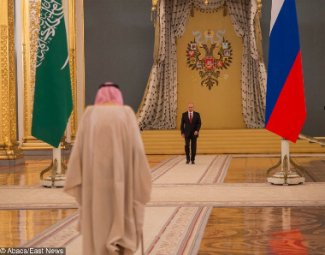Analyses
The Russian-Saudi summit

King Salman of Saudi Arabia paid an official visit to Moscow on 4th-7th October. During the visit he met President Vladimir Putin and Prime Minister Dmitry Medvedev. The main topics of the discussions were: the extension of the agreement of 30th November 2016 regarding the limitation of oil production; the political situation in the Middle East, with a particular focus on Syria; and the possibility of intensifying economic, military and technical co-operation. During the visit, 14 agreements pertaining to inter-ministerial and economic collaboration were signed.
Commentary
- Until recently, relations between Moscow and Riyadh have been rather frosty. This was exacerbated by the outbreak of the civil war in Syria in 2011, in which Russia and Saudi Arabia were supporting parties on opposite sides of the conflict. Riyadh has made numerous (fruitless) attempts (most recently in summer 2015) to persuade the Kremlin to withdraw its support for the Bashar al-Assad regime. In exchange the Saudis offered US$ 10 billion in investments and arms contracts. Military defeats of the Syrian opposition, Iran’s strengthened presence in Syria, and what Riyadh believes to be insufficient US activity in the Middle East have led King Salman to try to convince Moscow this time to distance itself from Iran, which Riyadh sees as its main geopolitical and ideological rival. Forced to come to terms with the survival of the Assad regime in Syria, the Saudis have been bargaining with Russia to ensure the best possible position for the opposition factions (the so-called “Riyadh group”) that they support in the talks on Syria’s future which are currently underway in Geneva and Astana.
- Although the Russian media have underlined the historic and ground-breaking nature of the Saudi monarch’s first official visit to Russia, its concrete results are inconsequential. Nearly all the agreements that were signed are of a non-binding or initial nature. Two joint investment funds (in the fields of energy and high technology) were set up, but the promised Saudi contribution of US$ 2 billion is likely to depend on the future political context. The same is true about the signed arms deals. In particular the announced acquisition of the Russian S-400 anti-aircraft missile system should be treated as part of negotiating tactic of Riyadh towards the US. The only hard contract which was signed provides for the production of Kalashnikov assault rifles in Saudi Arabia, but even in this case no details were revealed.
- No specific agreements were reached regarding the extension of the oil agreement, even though both countries (leading oil producers and exporters) are interested in it. Nevertheless, the fact that this issue is being negotiated may be enough to lead to an increase in oil prices on the global markets, which brings about tangible advantages for oil exporters (e.g. in the first two quarters of 2017, Russian revenues from oil exports rose by nearly 40% when compared to the first half of 2016). On the other hand, due to the oversupply of oil on the global market and the projected systematic lowering of the global increase in demand for oil, competition between oil exporters has intensified, which serves as discouragement when considering concluding long-term agreements about the limitation of oil production.




